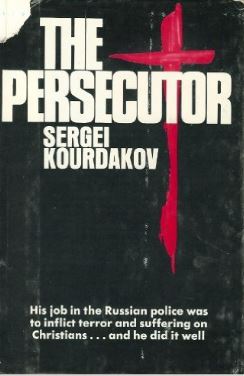 This blog post is unlike any that I’ve ever written. It is about a Russian naval defector, a mysterious death, a best-selling book, a journalist’s vision, a broken heart that longed to be heard, and a mystery that gripped an investigator.
This blog post is unlike any that I’ve ever written. It is about a Russian naval defector, a mysterious death, a best-selling book, a journalist’s vision, a broken heart that longed to be heard, and a mystery that gripped an investigator.
A Russian Naval Defector
By all accounts, on the night of 03 Sept 1971, Sergei Kourdakov, a Russian radio officer, jumped into the frigid waters from his ship and swam several miles to a Canadian shoreline. The distance he swam is disputed. What is not disputed is that he should never have survived. Sergei prayed to God and eventually staggered to shore. He claimed political asylum, and after weeks of tense discussions, Sergei was relieved to learn that he was not going to be handed back to the Russians.
Sergei Kourdakov became a Christian and was soon thrust into the spotlight. Sponsored by an organization called, Underground Evangelism, Sergei eventually began to share his powerful testimony to large groups of eager Christians. His story was captivating. His testimony revealed that he had been a KGB operative, who personally led 150 clandestine raids into homes of Russian Christians for the purpose of confiscating their religious material and beating them, sometimes to death.
A Mysterious Death
On 01 Jan 1973, Sergei was found dead in a hotel room in California of a gunshot wound to the head. His death was ruled an accident. However, he had claimed that he had already been contacted by the KGB, and had warned his friends that if he was ever found dead that it would be made to look like an accident.
A Best Selling Book
Posthumously, Underground Evangelism published a best-selling autobiography about Sergei’s life and conversion, known in English as, The Persecutor. According to Wikipedia, the book was translated into at least fourteen different languages, sometimes titled, Forgive me, Natasha. Millions of copies were reportedly sold. Christians all over the world have been inspired for decades by Sergei’s story of hate turned to love as he met Jesus.
A Journalist’s Vision
One inspired Christian was journalist, Caroline Walker. In 1992, she read The Persecutor while on a mission trip to Siberia. While there, she attempted to search out some details of the book, but could not verify them. Years later, still taken by his story, Ms. Walker returned to Russia in order to verify Sergei’s story and eventually make a screenplay based on his life. Ms. Walker admitted that she began with an agenda: that Sergei’s story was true; she just needed to verify the details for the screenplay. In fact, she had claimed that she had had a vision from God in which she was a pen in His hand. So, she began to interview people who were named in his book, or who had firsthand knowledge of his life.
As her investigation was conducted, however, Walker’s skepticism increased. Eventually, she reached the conclusion that Sergei had lied about his past and his autobiography had been embellished. Her years of labor are summarized in the award-winning documentary, Forgive me, Sergei.
A Broken Heart Longing to be Heard
Forgive me, Sergei was a hard film for many to watch. For one woman in particular, it stirred up more than just emotions, it compelled her to write a book based on her very personal story with Sergei. That book, A Rose for Sergei, was released in 2014 by author, K. Kidd. Her story is an incredibly heart-warming – and heart-breaking account. It chronicles her short time with Sergei. It is raw with emotion and shows a side of Sergei that probably only a few ever saw.
I knew none of the above history as I was loaned a copy of The Persecutor in December of 2016. I have read many missionary accounts, and was interested in digesting another. Like so many before me, I was quickly captivated by Sergei’s life. Anxious to know more, I went online and quickly found Ms. Kidd’s book, A Rose for Sergei. I downloaded it and read it in two days. It is a touching, personal look at this Russian enigma, told in open, honest terms by a woman who’s heart had been torn when she learned of his untimely death. It rings with sincerity and is a very believable account.
Fueled by a thirst for even more information about this remarkable man, I found myself trolling the web. It was then that I found the documentary, Forgive me, Sergei. Not knowing anything about it, I began watching. Soon, I was filled with confusion, then hurt. Could it be that this man was no hero? Was he just a wolf in sheep’s clothing seeking to get rich from a wild tale sold to an eager audience? It was not what I had expected to learn. As of 08 Feb 2017, the entire documentary is available here.
The Investigator
Let me pause in this blog to introduce myself to those who may not know me. I am first and foremost a Christian. I have served as a pastor and have done missionary work. I currently minister regularly in our local jail and at a drug rehab center. For the past 31 years, however, I have also worked professionally as an investigator. I am a Certified Insurance Fraud Investigator as well as a Fraud Claims Law Specialist. I have conducted countless interviews and have undergone professional training, such as the Reid Technique of Investigative Interviewing & Advanced Interrogation Techniques course, Scientific Content Analysis, and many deception detection training classes. I do not claim to be an expert in this field. However, I suspect that I am further advanced in these techniques than the average layman.
From the first time I watched the documentary, my trained senses had caught bits and pieces of information that suggested a conflict in what was being said. This information came mostly in the form of body language, in which I have received some training to recognize. I noted that the body language of some individuals in the film did not always match the words being spoken. So, I watched the documentary again and picked up more inconsistencies. It soon had my full attention from a different perspective. I was now in ‘investigator mode.’
It is important to note that the techniques that I may refer to in this blog are techniques that an investigator uses as tools. Like a polygraph test, they are not admissible in court. Rather, they are used by an investigator as “red flags,” indicating that he or she may have hit upon something that needs to be explored further. Discovering one of these red flags does not necessarily mean that deception is taking place. However, experience has taught me that they are quite useful in pointing out possible problem areas in a testimony.
I eventually focused on eleven interviews of the documentary. I separated each of these interviews into smaller video segments so that I could watch them closely and in slow motion. I also prepared transcripts for each video and began taking notes. My findings of these eleven video segments are provided below. However, let me first describe a few of my handicaps in doing this:
- I do not understand the Russian language. Therefore, I must rely solely on the subtitles for translation. A better translation of some words or phrases may influence my opinion of that segment.
- I am relying on the timing of the subtitles. If a subtitle flashes on the screen much too early or late, then any body language interpreted for that sentence may not be accurate.
- I do not have the entire interviews. Observing a person prior to an interview helps to establish a baseline for that person. My opinions may be different if I could observe the interviews in their entirety. That being said, it is assumed that the editors of the documentary would not have put forth segments that least-supported the conclusions that they had reached. Rather, the segments provided to the viewers would seem to be the most supporting portions. So, although I didn’t have the full interviews, I most likely have the best representative segments.
________________________________________
Interview 1 – Unnamed Christian Woman
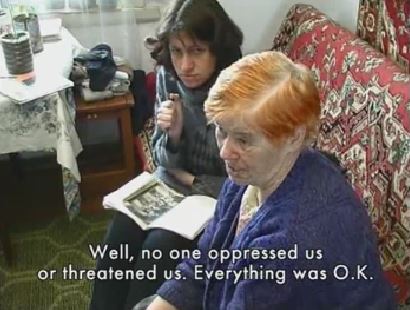 This late-middle aged female was not identified. It appeared she had been interviewed to determine if she had been aware of the persecution of Christians. Click here for the transcript. Click here to watch the interview.
This late-middle aged female was not identified. It appeared she had been interviewed to determine if she had been aware of the persecution of Christians. Click here for the transcript. Click here to watch the interview.
The first word of her testimony was translated, “nonetheless.” This means, “in spite of that.” It is a connecting word or phrase referring to some antecedent subject. Unfortunately, the viewer has no record to what activity she was referring.
This female’s testimony can be understood as beginning something like, “in spite of that, it was quiet.” It may be helpful to know to what subject she was referring.
The camera angle is not optimum, showing only her side of face and back of head. I detected no signs of deception.
_________________________________________
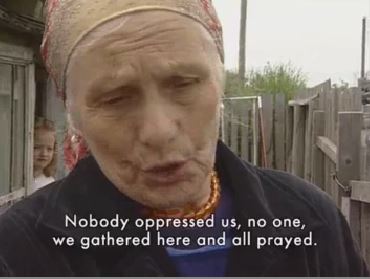 Interview 2 – Unnamed Christian Baptist Woman
Interview 2 – Unnamed Christian Baptist Woman
As I recall, this female was identified as a Baptist. She also appeared to have been interviewed in order to determine if she had been aware of persecutions. Click here for the transcript. Click here to watch the interview.
I detected a slight shoulder “bump” or shrug with her first sentence, “Nobody oppressed us.” As Jack Morgan, an old supervisor and a trainer in deception training used to say, the shoulder bump is “a hundred percenter.” I concur. It nearly always indicates that there is disagreement between the spoken words and a belief in those spoken words. ( See Interview #11 for a demonstration of how this can be true.)
In my opinion, the sentence “Nobody oppressed us” is questionable. Perhaps she needed to qualify her remark. Or, she may have been deceptive. In any event, I do not take that sentence at face value.
_________________________________________
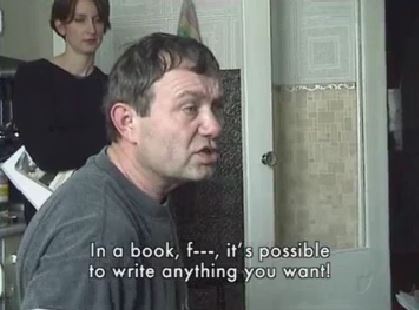 Interview 3 – Sergio Kanonenko
Interview 3 – Sergio Kanonenko
This male is identified as a former classmate of Sergei, and someone who may have participated in KGB activities. Click here for the transcript. Click here to watch the interview.
The first question that we have posed to this witness suggested that he had been with Sergei in the KGB. The witness answered the question with a question (red flag) and then denied it. The final question pointedly asked the witness if he had helped the KGB. The witness avoided the question and went on a small rant about how anything can be made into a book (another red flag).
Avoiding a question is a red flag to an investigator. When someone is asked a simple, yes or no question, but begins to dance around it, the investigator should know that he/she has hit upon something important. It is my belief that people use avoidance when the truth of some questions are uncomfortable to provide.
This witness answered all questions directly, except those having to do with the KGB. This suggests to me that the interviewer has struck a sensitive area with this witness by questions that associate him with the KGB.
_________________________________________
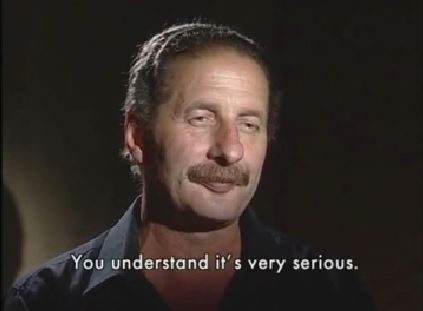 Interview 4 – Yuri Berestennikov
Interview 4 – Yuri Berestennikov
This male was interviewed because he had been identified as accompanying Sergei on the many, violent raids against Christians in the book, The Persecutor. Click here for the transcript. Click here to watch the interview.
This is an extremely interesting interview, and one of the most remarkable ones. The video is limited to the witness’s head and face, but it is enough to raise some questions. He displayed many, very rapid eye blinks as the questions are being staged. It is my opinion that the rapid eye blinks are a result of the stress of the questions. However, even without the rapid eye blinks, his responses were suspicious.
The witness was told that according to The Persecutor, his main job had been to fight with believers. He immediately responded with a question, “with whom?” (red flag). He was told “believers,” and for further identification, the word “Christians” was added. Berenstennikov rapidly blinked 13 times in less then 14 seconds as he continued listening.
Berenstennikov then answered again by asking, “with believers?”(Red flag.) This was once again confirmed and the interviewer added that he may have had beaten old ladies and children to death. For the third time, Berenstennikov answered with a question. This time he asked, “really?” (Red flags now all over the place.)
NOTE: I contacted Caroline Walker prior to the public release of this blog. She indicated “the word ‘believers’ in Russian was incomprehensible to him because the director was Polish and was putting the accent on the wrong syllable – the 2nd instead of the first.”
Answering a question with a question does not necessarily indicate that one is being deceptive. However, three in a row had put me on high alert. I believe in this case, Berenstennikov was clearly under stress and was buying time to develop an answer. In particular, I believe that the word “believers” was stressing him.
Before Berenstennikov responded, he was reminded by the interviewer that these allegations were very serious. Indeed, they are. Implicating someone in the murder of innocent women and children is a very serious charge. At this point Berenstennikov forced a smile. I don’t believe the smile was genuine. Rather, I suspect it indicated that he had finally formed an answer.
His response was to suggest that Sergei only had told the stories to create an image for himself. Surprisingly, Berenstennikov never denied the allegations. Avoiding the question as he did is inconsistent with a person who had nothing to do with the activity in question.
The interviewer then asked a very key question. It is a question that was asked to a lot of the interviewees, and one that I am grateful for having been asked. It is a question that gives a very good glimpse into the thought process of the interviewee. The question has to do with their opinion of Segei Kourdakov after being named in his book in what they have just indicated are lies.
Before we examine this witness’s response, let me more fully explain the importance of this question. Interviewers and interrogators often use this ploy. When questioning a person about an offense or crime, the interviewer will ask what the interviewee thinks should happen to the guilty party. When the interviewee is not connected to the offender, then he/she will generally require some sort of just punishment. However, if the interviewee is connected to the offender, or is the offender, they tend to be more lenient in their condemnation.
When Berestennikov was asked about what he felt about being implicated by Sergei in the murder of innocent women and children, he asked, “what is offensive about it?” I believe that this is a very telling response. Imagine that someone accused you of committing violent crimes with them, of which you are innocent. When you were asked about this person, would you brush it off as nothing? Or, would you express your anger toward their unjust actions while trying to separate yourself from someone who is lying? This witness did not find it offensive.
In Interview #11, you can hear the emotion in Caroline Walker’s voice when L. Joe Bass accused her of having an agenda. She had been accused of something she had believed was false and reprehensible, and she was obviously hurt. On the other hand, Berenstennikov was being accused of something far more sinister than having an agenda, yet he smiled and tried to brush it off. Her response was genuine. Berenstennikov’s was not. I do not find this witness credible.
_________________________________________
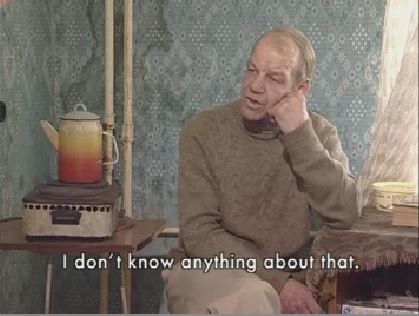 Interview 5 – Vladimir Zelenyov
Interview 5 – Vladimir Zelenyov
This interview is of a male identified as a former classmate of Sergei, and one who was implicated in the persecution of Christians. Click here for the transcript. Click here to watch the interview.
The video segment began with Zelenyov listening to a tape recording of Sergei’s testimony. The segment is about Sergei’s conversion from atheism to Christianity. It is not a particularly offensive audio recording. I do not know what else had been shared with him before he responded.
The witness was asked what he thought. He responded by repeating the question. Then after a pause, he began to talk. He seemed confused by what he had heard and suggested that he didn’t understand how Sergei could “decide on this.” However, what he was referring to as “this” is not clear. Given only the context of the segment, he would have been referring to Sergei’s conversion. This was not a serious indictment.
Caroline Walker then suggested to Zelenyov that Sergei had reported that Zelenyov had participated in violent raids that included rape. He shook his head and said, “I don’t know anything about that.” The witness made the remark while supporting his head in his hand. This is a red flag position, adding “support” to words which may not carry much weight in themselves.
Saying, “I don’t know anything about that” could have been an honest response. However, a much stronger response to the charge of rape would be to say something like, “I never raped anyone!”
Although this is subjective, interviewers are trained that a guilty person will often (not always) avoid using the harsh sounding words of the crime. For example, a guilty person might say, “I didn’t do anything to him” instead of, “I didn’t murder him.” Or, “I didn’t touch that girl” instead of “I didn’t rape that girl.” On the other hand, an innocent person will often (not always) use the words, “I didn’t murder him,” or, “I didn’t rape her.” Innocent people tend to feel comfortable using the harsh words because they aren’t connected to those words.
As I’ve pointed out, this witness may have been honest when he said, “I don’t know anything about that,” but it is a very, very weak reply to a very serious charge.
When asked what he would say to Sergei about making up these lies about him, Zelenyov replied, ” I simply wouldn’t talk to him about this. Because we never had anything like that. He just made it up.”
He simply wouldn’t talk to him about being falsely accused of violent raids that included rape? This is not the kind of response that I would expect from someone being implicated in such a serious charge.
_________________________________________
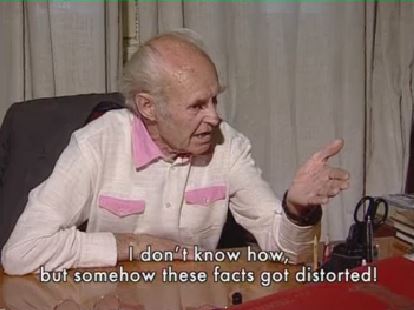 Interview 6 – Victor Nikivorov
Interview 6 – Victor Nikivorov
This male was identified as Lt. Col. of the police and Director of the Communist Youth Group. The Persecutor had identified him as the director of their raids against Christians. He had been described as a career police officer, and had been given the nickname, “Iceberg Niki.” Click here for the transcript. Click here to watch the interview.
The video segment began with Nikivorov listening to a reading of The Persecutor. The reading began on page 119, then jumped to page 121, and then included a fragmented sentence from page 122 (according to my English version). This reading was from the section having to do with the formation of the group of men who would conduct the raids on believers. Chronologically, it took place before the men were ordered to raid and arrest believers, or knew that they were going to.
Nikivorov immediately responded to details which he said were nonfactual. He indicated that “at that time” there “were” no bars, and there “was” no karate, judo, but only Sambo as a means of self defense. However, regarding the military base, Nikivorov used a different tense and said that there “is” no military base. This change of tense is a red flag, and may suggest that there had been a military base.
What is far more important, however, is that when Nikivorov heard that a raid had been ordered, which left men lying on the floor groaning and that Sergei and his men afterward went to the bars to drink, that he only denied the bars, karate, and judo. He did not specifically deny the raids or the violence.
The reason this is a significant red flag to me is that it is not uncommon for a person, when confronted with an incriminating account, to focus their reply on the portions that they know to be incorrect. This allows them to answer truthfully while giving the impression that the entire story is false.
Nikivorov stated that the book was “all lies.” He then indicated that no matter how bad life is in Russia, or how difficult the economical and political situation – that they haven’t lost their memories. The latter part of this argument seems disconnected. I don’t believe anyone had charged them with losing their memories. A weightier argument would have been, “No matter how bad life is in Russia, we would not have conducted illegal, violent raids.”
NOTE: Caroline Walker pointed out that “memories” was a bad translation, and that it might better be understood as “minds” or “senses.”
When asked what he would say to Sergei if he were alive, the witness indicated that he would hug and kiss him and receive him like a son. This is an interesting response. The word “son” suggests two important things: 1) that they had a familiar relationship, 2) that the dynamics of their relationship were that of father/son, not peer to peer.
I detected no body language red flags. However, this witness’s denials about the less significant issues raise a number of other red flags.
_________________________________________
 Interview 7 – Boris Labonov
Interview 7 – Boris Labonov
This male was interviewed as he apparently had stayed at the same orphanage as Sergei Kourdakov, which had been depicted as a violent place. The video segment begins as he sits through a reading of Sergei’s book describing the orphanage and one of its director’s, “Big” Irene. She was described as a fearsome, brutal woman in Sergei’s account.
As this witness hears the account, he can be seen shifting uncomfortably in his chair. The film then flashes to his interview. No questions are posed to him during this short section. Click here to read the transcript. Click here to watch the interview.
My first response to this witness was to be suspect because of the repeated shoulder shrugs. However, the more I watched the clip the more I felt uncertain. They are slower and more pronounced than what I would have expected from a deceptive person. On the other hand, while he is reporting that there was food, clothing, and linens, and that the personnel was good, the witness can also be seen shaking his head, “no.” Shaking one’s head while answering in the positive, or nodding while answering in the negative can be possible signs of being in disagreement with one’s own words.
_________________________________________
 Interview 8 – Interview Victor Yazikov
Interview 8 – Interview Victor Yazikov
This male is identified as a childhood friend of Sergei, and presumably familiar with the orphanage. He was present with the previous witness while the account of “Big” Irene was read. Click here for the transcript. Click here to watch the interview.
I detected no signs of deception in this segment. Therefore, I will take his words at their face value. The problem is that instead of talking about Big Irene specifically (the portion that had been read to him), he began to discuss the caretakers in general. He described them as an older generation who had been very conscientious, and who had worried about their charges. He likened them to mothers.
Without knowing what question had been posed to this witness, it is very hard to put it in context. I believe that he was genuinely angry and disgusted. He indicated very strongly that he had been betrayed, and this feeling appears to be genuine. However, it is not necessarily clear why he felt betrayed. Was he betrayed because Sergei’s portrayal of the orphanage was completely untrue, or was he betrayed because one should not “say such things about one’s own mother?”
_________________________________________
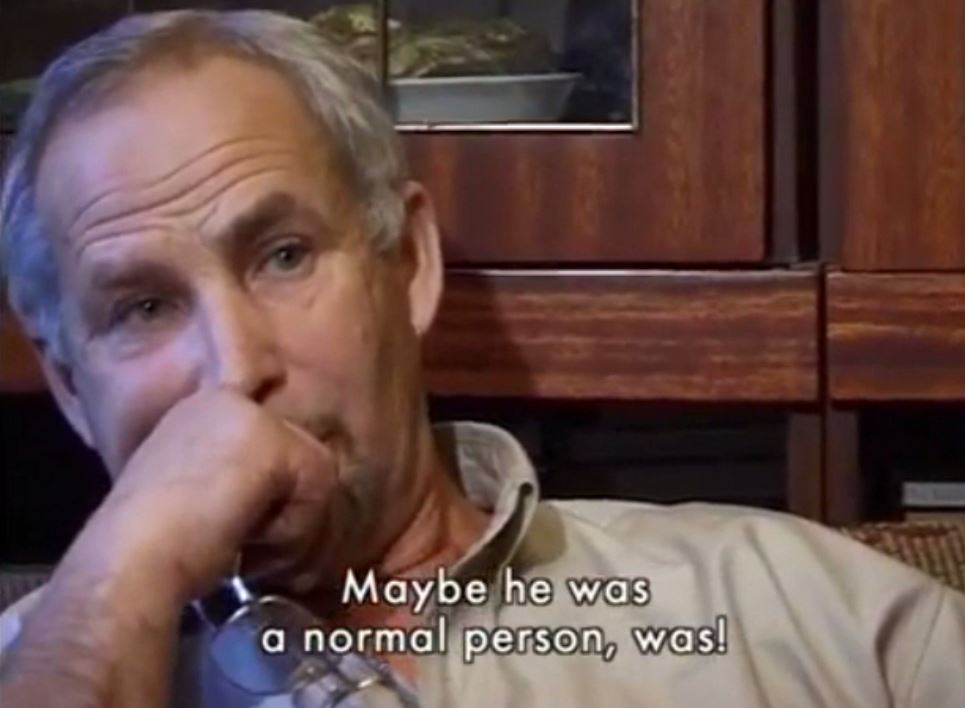 Interview 9 – Alexei Samokhin
Interview 9 – Alexei Samokhin
This male was identified as a childhood friend of Sergei. He condemned The Persecutor as lies. Click here for the transcript. Click here to watch the video.
Samokhin displayed body language which raised red flags. As he began to speak, he leaned his head to the right, and placed his right hand very near his mouth. He continued speaking and can be seen beginning to move his mouth deeper behind his right hand. He briefly moved his hand away, but as the camera cut away from him, he can be seen moving his right hand back toward his mouth. Covering one’s mouth with a hand while speaking is often seen as an indicator of deception.
The witness was then asked what he thought of Sergei Kourdakov. As he spoke, he touched his face – another sign of possible deception. He also shrugged several times, but I cannot be certain what he is saying at those precise moments. These may be additional red flags. He continued speaking and at one point almost entirely covered his mouth with his hand. These indicators do not give me good reason to be confident in what he had to say.
_________________________________________
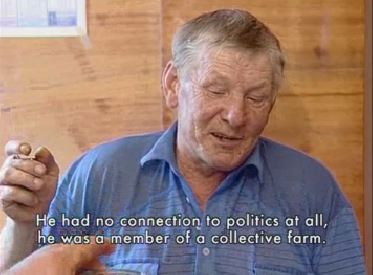 Interview 10 – Boris Kourdakov
Interview 10 – Boris Kourdakov
This male was identified as Sergei Kourdakov’s brother. The interview appears to take place in a home at a dinner table. There are others in the room and various voices are overheard. The video conversation has to do with Sergei Kourdakov’s father.
The interview may be given to us out of chronological order. Kourdakov is first seen seated at a dinner table and is turned slightly to his left. He is next seen turned completely, facing the camera. The third scene is of him seated again as he had been at the beginning.
This is somewhat of a difficult scene to examine. There appeared to be multiple people in the room during the video. A female is heard interjecting several times, and the witness appears to have a brief conversation with someone off camera, presumably at the table. Click here for the transcript, which is based on the provided subtitles. Click here to watch the interview.
None of Kourdakov’s replies raise any red flags except possibly one. This is where he answered about his father, “He had no connections to politics at all, he was a member of a collective farm.” He said that while offering a slight shoulder shrug. He then leaned back, away from the camera as he said, “He worked as a mechanic during his last days.” A good follow up question at this point would have been, “tell me what you mean that ‘he had no connections to politics at all.’?”
_________________________________________
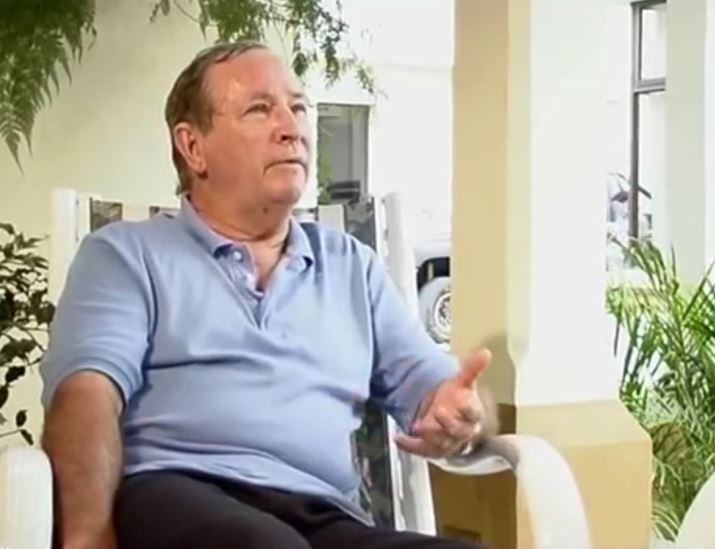
Interview 11 – L. Joe Bass
This English-speaking male is identified as the Director of Underground Evangelism and editor of Sergei’s autobiography. This is a very important interview.
Earlier in the documentary, a short excerpt of an interview with Bass was included. Near the end of the documentary, this segment was played. Bass is wearing the same shirt and pants, sitting in the same chair, and is in the same room in both segments. The camera angles are different, as well as the coloring or lighting. But, they appear to have been part of the same interview.
In this second segment, it appears that Walker was attempting to confront Bass with the evidence of which she had been convinced. Click here for the transcript of the second segment. Click here to watch the interview.
The first question posed to Bass was, “did you embellish or exaggerate his story at all?” The question was clearly about Bass, and could have been answered with a yes or no. However, Bass avoided talking about himself and instead talked about Sergei. He did not confirm or deny if he had embellished the story. This is a red flag.
While answering this initial question, the first thing Bass said was, “Sergei approved everything that was written.” He did this while shaking his head, “no.” This may suggest that Bass did not agree with that sentence. Another red flag.
When asked if there was anything that Bass could be told that would cause him to doubt Sergei’s story, he looked upward and began to suggest that Walker was naive and had been lied to in Russia. During this time he began to display many rapid eye blinks, suggesting stress.
Bass is then heard saying, “I have no idea what your agenda is.” He said this with a quick left shoulder shrug. When I saw this I wondered what could have been deceptive about that statement. Then, just a few moments later, he revealed,”I know what your agenda is.” It is my opinion that Bass felt he already knew what Walker’s agenda was when he told her that he didn’t. This would explain the shoulder shrug; he didn’t believe his words, “I have no idea what your agenda is.”
Clearly, Bass became angry. This was not a pretense. If he became as angry as quickly as it appeared, then this would be a red flag.
I believe that Bass’s anger is from one of two possibilities. 1) He had believed the story of Sergei to be true, and when questioned had felt that his and Sergei’s character were under attack. Or, 2) he had embellished Sergei’s story and was feeling threatened.
One might believe that there is a third possibility; that he had known that Sergei had lied and he was angry that it was being discovered. However, I do not believe that this is the case. If he had known Sergei had lied, and that he had only repeated the lie in his book, then I feel that he would have not avoided Walker’s first question. I believe that he would have answered her, “no, I did not embellish his story.” This truthful answer would have exonerated him in the event that it was proven that Sergei had lied.
Bass’s question-avoidance and quick anger leave me to believe that his testimony is suspect.
_________________________________________
The following interviews are those that I feel are the most questionable. They appear in descending order from the most doubtful.
Yuri Berestennikov
L. Joe Bass
Vladimir Zelenyov
Victor Nikivorov
The following interviews are those that I feel had provided questionable responses. They appear in descending order from the most doubtful.
Sergio Kanonenko
Alexei Samokhin
Unnamed Christian Baptist Woman
The following interviews seemed the most believable:
Boris Labonov (This interview had a red flag but in the end I gave him the benefit of the doubt.)
Boris Kourdakov (This interview had a red flag but in the end I gave him the benefit of the doubt.)
Unnamed Christian Woman
Victor Yazikov
Summary
Since I had indicated at the onset that I had been quite taken by Sergei Kourdakov’s story, one might argue that my findings are biased. I would respond by pointing out that I held the Bass interview under the same critical lens and found it to be a suspicious interview as well. Had I wanted to exonerate The Persecutor, I would have found Joe Bass credible, which I did not.
The purpose of this blog was to deal solely with the videotaped evidence published in the documentary, it is not to defend The Persecutor, or to be judgmental of Caroline Walker’s work. As a matter of fact, after watching the film many times, I’ve reached the conclusion that she displayed a high ethical standard, reflecting a solid moral fiber. She has earned my respect and admiration. She admittedly began her investigation with a strong emotional and religious investment, firmly believing The Persecutor. It is not an easy thing to change one’s mind when you are so deeply attached to a matter. When faced with what she saw as a mountain of evidence, she felt compelled to change her position by what she believed to be the truth. I respect that very much.
Notwithstanding the above, it is my opinion that the testimony given to Ms. Walker in a number of the interviews was not completely reliable. Furthermore, I did not hear (or find in the transcripts) the strong denials that should have been present regarding the very serious allegations made. This has led me to the conclusion that there remains not only a strong possibility that some of the details of sections of The Persecutor are based on fact, but that they may likely have occurred. These most-probable sections would be the violent raids and persecution of Christians.
I’m afraid, however, that the truth about what really happened may never be fully known.
Peace,
dane
Dane Cramer is a backpacker, Christian blogger, jail chaplain, amateur filmmaker, and author of two books: Romancing the Trail and The Nephilim: A Monster Among Us